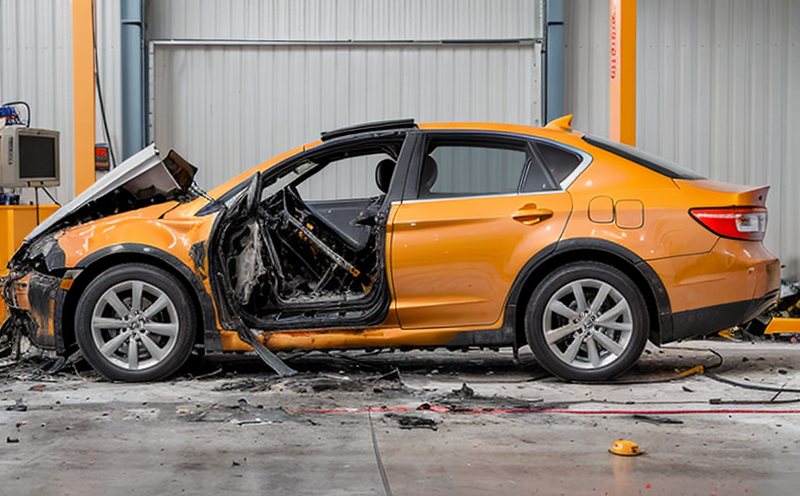EN 61982 Mechanical Abuse Testing of Secondary Batteries for EV Applications
The European Standard EN 61982-1:2013 specifies the requirements for mechanical abuse testing of secondary batteries, particularly in electric vehicle (EV) applications. This standard is crucial to ensure that batteries can withstand various abusive conditions without compromising safety or performance.
Secondary batteries used in EVs are subject to a wide range of mechanical stresses during normal operation, charging, and potential accidents. EN 61982-1 addresses these challenges by outlining specific test methods designed to simulate real-world scenarios that might occur under harsh conditions such as crushes, drops, thermal impacts, and vibration.
The standard is particularly important for electric vehicle manufacturers who need to comply with regulatory requirements and ensure the safety of their products. It provides a standardized approach to testing secondary batteries (such as lithium-ion batteries) to verify their robustness against mechanical abuse. Compliance with EN 61982-1 ensures that these batteries meet stringent quality standards, enhancing overall product reliability.
During testing according to EN 61982-1, the battery specimen is subjected to various abusive conditions. For instance, a crush test involves applying controlled pressure from above until the specified load is achieved or up to 20% of the original height reduction. A drop test simulates accidental falls by dropping the battery from a certain height onto a hard surface. Thermal abuse testing exposes the battery to high temperatures to assess its stability and performance under extreme conditions.
Testing according to EN 61982-1 is essential for several reasons:
- To ensure that batteries can withstand mechanical impacts without compromising safety or performance.
- To identify potential weaknesses in design or manufacturing processes before they become critical issues.
- To provide a basis for comparing different battery technologies and products under standardized conditions.
Manufacturers of EVs, especially those targeting global markets, must adhere to international standards like EN 61982-1. Compliance not only ensures product quality but also helps in reducing the risk of accidents and recalls, thereby protecting both consumers and manufacturers.
The testing process is highly technical, involving precise instrumentation and controlled environments. Specimens are prepared according to specific protocols outlined in the standard. Once prepared, they undergo a series of mechanical abuse tests that simulate real-world conditions. The results provide valuable insights into the battery's durability and safety under abusive circumstances.
In conclusion, EN 61982-1 is a vital tool for ensuring the quality and reliability of secondary batteries in EV applications. By adhering to this standard, manufacturers can enhance product performance, ensure compliance with regulatory requirements, and ultimately improve consumer safety.
Why It Matters
The mechanical abuse testing outlined in EN 61982-1 is critical for several reasons. First and foremost, it helps manufacturers identify potential design flaws or manufacturing defects that could lead to catastrophic failures under abusive conditions.
- Safety Assurance: Ensures that batteries do not catch fire or explode during accidents or malfunctions.
- Regulatory Compliance: Meeting stringent standards is essential for market entry and certification in many regions, including the European Union.
- Product Quality: Provides a benchmark for assessing the durability and reliability of batteries used in EVs.
The testing process involves subjecting specimens to controlled mechanical stresses that mimic real-world scenarios. For example, crush tests simulate what could happen during an accident or improper handling. Drop tests assess how the battery behaves after being dropped onto hard surfaces. Thermal abuse tests evaluate the battery's stability under extreme temperature conditions.
By conducting these tests according to EN 61982-1, manufacturers can ensure that their products meet international standards and are safe for use in EVs. This not only enhances product quality but also reduces the risk of accidents and recalls, thereby protecting both consumers and manufacturers.
Quality and Reliability Assurance
The mechanical abuse testing according to EN 61982-1 is a cornerstone for ensuring high-quality and reliable secondary batteries in electric vehicle applications. This section delves into the specific quality assurance measures that are critical for compliance with this standard.
- Instrumentation: High-precision equipment such as load cells, accelerometers, and temperature sensors are used to monitor the mechanical stress applied during testing.
- Data Collection: Comprehensive data logging ensures accurate recording of test parameters for analysis. This includes force, displacement, and temperature readings throughout each test cycle.
The testing process involves several critical steps that must be meticulously followed to achieve reliable results:
- Specimen Preparation: The battery specimen is carefully prepared according to the standard's specifications. This includes cleaning, labeling, and ensuring that all necessary components are present.
- Test Setup: The test setup must be precise, with the correct fixtures and load-bearing devices in place for each type of abuse test.
- Data Analysis: After testing, data from the instrumentation is analyzed to determine compliance with the standard's acceptance criteria. This involves checking for any signs of failure or degradation beyond acceptable limits.
The results of these tests are crucial for quality assurance purposes. They provide valuable insights into the battery's performance under abusive conditions and help identify areas for improvement in design and manufacturing processes.
Customer Impact and Satisfaction
The mechanical abuse testing according to EN 61982-1 significantly impacts customer satisfaction by ensuring that batteries are robust, reliable, and safe. Here's how:
- Safety: Customers can be assured that the batteries used in their EVs will not catch fire or explode during accidents or malfunctions.
- Performance Consistency: By adhering to this standard, manufacturers ensure consistent performance across all batches of batteries. This leads to a better user experience and trust in the brand.
- Regulatory Compliance: Meeting international standards like EN 61982-1 helps manufacturers comply with regulatory requirements, ensuring that their products are safe for use in EVs.
The testing process also has a positive impact on customer satisfaction by reducing the risk of accidents and recalls. This not only protects consumers but also enhances brand reputation and loyalty. Customers can trust that they are purchasing high-quality batteries that meet stringent safety standards.





